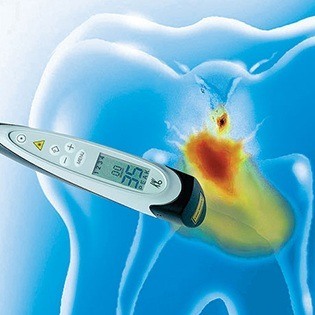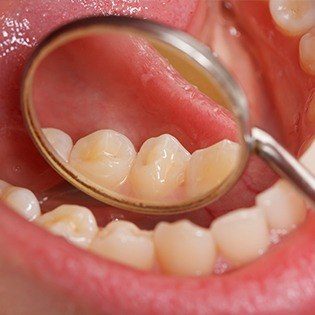DIAGNOdent Cavity Detection System – Bergenfield, NJ
Find Decay the Easy Way with DIAGNOdent
One of the most important things we do for our patients is identifying and filling cavities. Since even the smallest spot of decay can threaten the integrity of the entire tooth, finding and filling cavities is the key to preventing further problems of all kinds. Historically, that's why lengthy poking and prodding sessions have been an acceptable, if not very comfortable, part of typical dental exams. However, many people don't realize that these methods of decay detection are only 50% to 75% successful. Cavities often hide along fissure lines, or inside biting or occlusal surfaces. Furthermore, these mechanical exploratory methods are limited to finding only those cavities that are equal to or larger than the probe head. For all these reasons, we've invested in DIAGNOdent: a revolutionary new, thorough means of detecting cavities so your exam can be fast, easy, and nearly imperceptible.

Laser Reflection Spots Imperfection

DIAGNOdent technology uses a simple laser diode to inspect your teeth, comparing reflection wavelength against a known healthy baseline wavelength to uncover decay. How? First, we aim the laser onto one of your healthy enamel tooth surfaces to give us a benchmark reading. Then, we continue around your mouth, shining the laser into all suspect areas. As the laser pulses into grooves, fissures, and cracks, it reflects fluorescent light of a specific wavelength. This light is measured by receptors, converted to an acoustic signal and then evaluated electronically to reveal a value between one and 100 before being displayed on a screen. Anytime the laser encounters a surface that reads differently than the healthy baseline value, it stimulates emission of fluorescent light of a different wavelength. A reading of 10-20 indicates some enamel softening, pointing to a potential problem area that merits close monitoring. A reading of 21-100 indicates a definite area of decay requiring a filling.
Early Detection, Precise Correction

Using DIAGNOdent technology allows us to catch more areas of decay sooner and with more precision. Further, it requires no X-rays and is a relatively comfortable procedure. Not only can it help prevent the spread of decay, but catching decay earlier means that any fillings required are simpler and shallower, preserving more of the tooth. This allows us to use minimally invasive filling procedures, such as drill-free air abrasion. Finally, we're able to objectively monitor any suspicious areas without repeated X-rays, harm to tissues, or need for protective measures.

